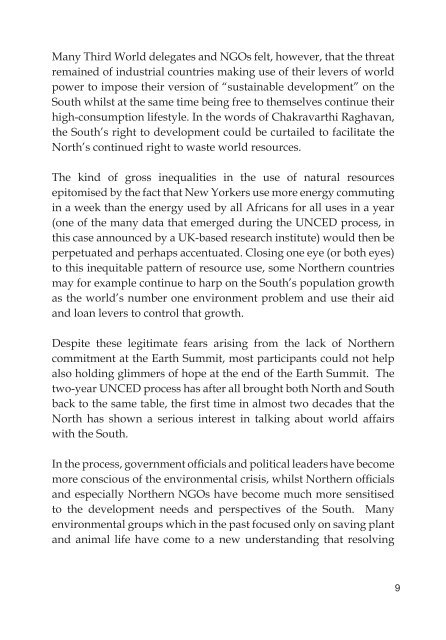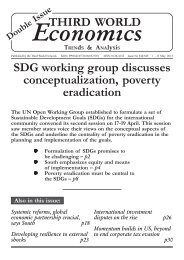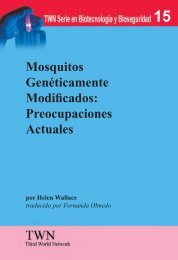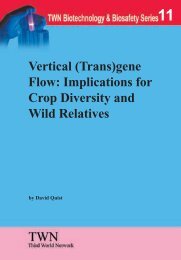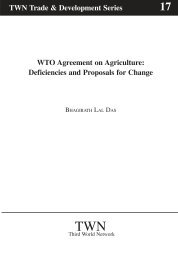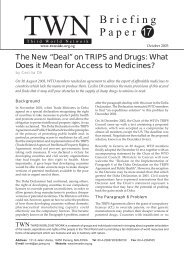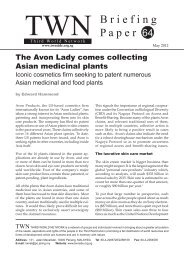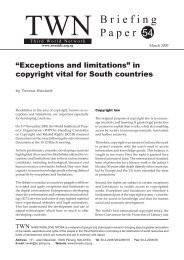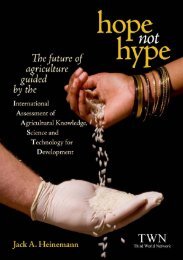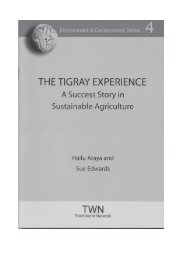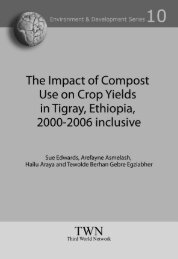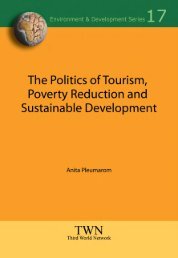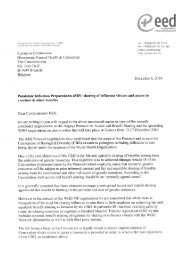Reaffirming the Environment-Development Nexus of UNCED 1992
Reaffirming the Environment-Development Nexus of UNCED 1992
Reaffirming the Environment-Development Nexus of UNCED 1992
Create successful ePaper yourself
Turn your PDF publications into a flip-book with our unique Google optimized e-Paper software.
Many Third World delegates and NGOs felt, however, that <strong>the</strong> threatremained <strong>of</strong> industrial countries making use <strong>of</strong> <strong>the</strong>ir levers <strong>of</strong> worldpower to impose <strong>the</strong>ir version <strong>of</strong> “sustainable development” on <strong>the</strong>South whilst at <strong>the</strong> same time being free to <strong>the</strong>mselves continue <strong>the</strong>irhigh-consumption lifestyle. In <strong>the</strong> words <strong>of</strong> Chakravarthi Raghavan,<strong>the</strong> South’s right to development could be curtailed to facilitate <strong>the</strong>North’s continued right to waste world resources.The kind <strong>of</strong> gross inequalities in <strong>the</strong> use <strong>of</strong> natural resourcesepitomised by <strong>the</strong> fact that New Yorkers use more energy commutingin a week than <strong>the</strong> energy used by all Africans for all uses in a year(one <strong>of</strong> <strong>the</strong> many data that emerged during <strong>the</strong> <strong>UNCED</strong> process, inthis case announced by a UK-based research institute) would <strong>the</strong>n beperpetuated and perhaps accentuated. Closing one eye (or both eyes)to this inequitable pattern <strong>of</strong> resource use, some Nor<strong>the</strong>rn countriesmay for example continue to harp on <strong>the</strong> South’s population growthas <strong>the</strong> world’s number one environment problem and use <strong>the</strong>ir aidand loan levers to control that growth.Despite <strong>the</strong>se legitimate fears arising from <strong>the</strong> lack <strong>of</strong> Nor<strong>the</strong>rncommitment at <strong>the</strong> Earth Summit, most participants could not helpalso holding glimmers <strong>of</strong> hope at <strong>the</strong> end <strong>of</strong> <strong>the</strong> Earth Summit. Thetwo‐year <strong>UNCED</strong> process has after all brought both North and Southback to <strong>the</strong> same table, <strong>the</strong> first time in almost two decades that <strong>the</strong>North has shown a serious interest in talking about world affairswith <strong>the</strong> South.In <strong>the</strong> process, government <strong>of</strong>ficials and political leaders have becomemore conscious <strong>of</strong> <strong>the</strong> environmental crisis, whilst Nor<strong>the</strong>rn <strong>of</strong>ficialsand especially Nor<strong>the</strong>rn NGOs have become much more sensitisedto <strong>the</strong> development needs and perspectives <strong>of</strong> <strong>the</strong> South. Manyenvironmental groups which in <strong>the</strong> past focused only on saving plantand animal life have come to a new understanding that resolving9


